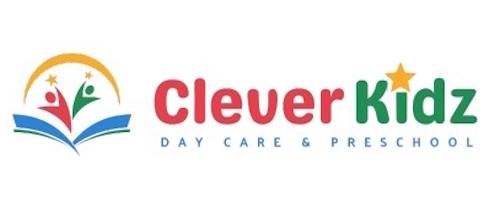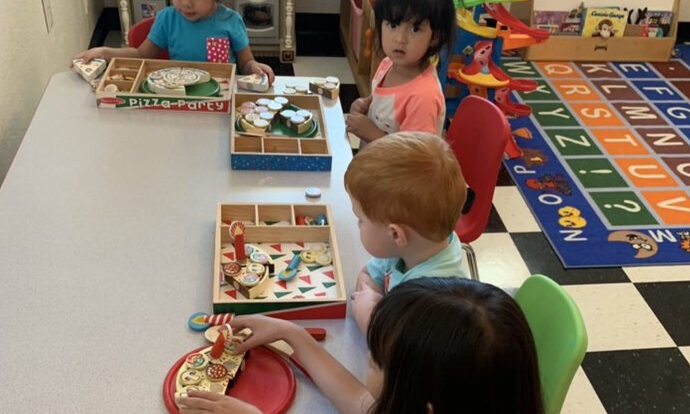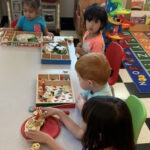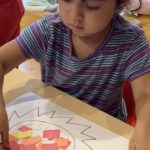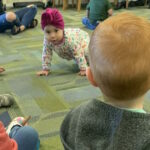In today’s fast-paced and ever-changing world, teaching mindfulness to young children is more important than ever. Early childhood is a critical period for developing foundational skills, and mindfulness practices offer a unique opportunity to nurture a child’s emotional, social, and cognitive growth. At Clever Kidz Day Care & Pre School, mindfulness is an integral part of our approach to holistic education. By incorporating mindfulness into daily routines, we help children cultivate self-awareness, resilience, and empathy—skills that will serve them throughout their lives.
This blog explores the concept of mindfulness, its benefits in early childhood education, and how Clever Kidz implements mindfulness practices to create a nurturing and empowering learning environment.
What is Mindfulness?
Mindfulness is the practice of being present and fully engaged in the current moment, without judgment. For children, mindfulness involves simple activities that encourage them to focus on their thoughts, feelings, and surroundings. It’s not about achieving a perfect state of calm but rather learning to navigate emotions and challenges with awareness and acceptance.
Key Elements of Mindfulness:
- Awareness: Recognizing one’s thoughts, feelings, and physical sensations.
- Presence: Staying focused on the present moment.
- Acceptance: Viewing experiences without judgment.
While mindfulness may seem abstract for young children, it can be taught in age-appropriate ways that resonate with their natural curiosity and playfulness.
Why is Mindfulness Important in Early Childhood Education?
Early childhood is a time of rapid brain development, and the skills children learn during these formative years set the stage for their future well-being. Mindfulness practices support children’s development in several key areas:
- Emotional Regulation – Young children often experience intense emotions but may lack the tools to manage them effectively. Mindfulness helps children recognize their feelings and respond in healthy ways. For example, teaching a child to take deep breaths when they feel upset can prevent emotional outbursts and foster self-control.
- Focus and Attention – In a world filled with distractions, mindfulness strengthens a child’s ability to concentrate. Simple practices like mindful breathing or guided visualization can improve attention spans, which are crucial for academic success.
- Stress Reduction – Even young children can experience stress, whether from separation anxiety, social interactions, or new experiences. Mindfulness provides children with strategies to calm their minds and bodies, creating a sense of safety and stability.
- Social and Emotional Skills – Mindfulness encourages empathy and kindness by helping children understand their own emotions and the feelings of others. This foundation supports healthy relationships and positive interactions.
The Benefits of Mindfulness in Early Childhood Education
- Cognitive Development – Mindfulness enhances brain function by increasing activity in areas responsible for decision-making, problem-solving, and emotional regulation. Research shows that children who practice mindfulness demonstrate improved memory, creativity, and academic performance.
- Emotional Well-Being – Practicing mindfulness reduces anxiety and promotes emotional resilience. Children learn to manage stress, face challenges with confidence, and develop a positive outlook on life.
- Improved Behavior – Mindfulness helps children develop impulse control and patience. By practicing self-awareness, children are better equipped to navigate conflicts and make thoughtful choices.
- Stronger Parent-Child Bonds – When parents practice mindfulness with their children, it strengthens their bond and creates a shared sense of calm. Activities like mindful breathing or family gratitude exercises foster deeper connections.
How Clever Kidz Incorporates Mindfulness?
At Clever Kidz Day Care & Pre School, mindfulness is woven into every aspect of our daily routine. Here’s how we bring mindfulness to life in our classrooms:
1. Morning Mindfulness – Each day begins with a brief mindfulness session to help children transition into the school environment. Activities include:
- Deep breathing exercises.
- Stretching and yoga poses.
- Setting a positive intention for the day, such as “I will be kind to my friends.”
These practices create a calm and focused atmosphere that sets the tone for the day.
2. Mindful Movement
Physical activity is a natural way for children to practice mindfulness. During outdoor play or yoga sessions, children are encouraged to pay attention to their bodies and movements. For example:
- Yoga for Kids: Simple poses like “tree” or “butterfly” help children connect with their breath and bodies.
- Nature Walks: Children observe their surroundings, listening to the sounds of birds or feeling the texture of leaves.
Mindful movement not only promotes physical health but also enhances sensory awareness.
3. Mindful Storytelling
Storytime is a perfect opportunity to teach mindfulness. At Clever Kidz, teachers use stories that highlight themes of gratitude, kindness, and emotional awareness. After the story, children are invited to reflect and share their thoughts.
Example Activity: After reading a book about friendship, children might discuss how the characters showed kindness or how they can be good friends in their own lives.
4. Mindful Breathing Breaks
Throughout the day, children take short “breathing breaks” to refocus their energy. Teachers guide children through simple breathing exercises, such as:
- Balloon Breathing: Imagine inflating a balloon in their belly as they inhale deeply, then letting it deflate as they exhale.
- Five-Finger Breathing: Trace the outline of their hand with a finger, breathing in as they go up and out as they go down.
These quick exercises are especially helpful during transitions or moments of high energy.
5. Gratitude Circles
At the end of the day, children participate in gratitude circles where they share one thing they are thankful for. This practice fosters a positive mindset and helps children focus on the good in their lives.
Mindfulness Activities Parents Can Try at Home
Mindfulness doesn’t have to end at daycare! Here are some simple activities parents can do with their children to continue fostering mindfulness at home:
1. Family Breathing Exercises – Spend a few minutes together practicing deep breathing. This can be a calming bedtime ritual or a way to start the day with focus.
2. Mindful Eating – Encourage children to pay attention to the taste, texture, and smell of their food. Ask questions like, “What do you notice about this apple?” to engage their senses.
3. Body Scan Relaxation – Guide your child through a body scan, asking them to focus on each part of their body, starting from their toes and moving up to their head. This helps children connect with their physical sensations.
4. Create a Calm Corner – Designate a space in your home where your child can go to relax and practice mindfulness. Include soft cushions, calming books, and sensory toys.
5. Gratitude Jar – Create a family gratitude jar where everyone writes down something they’re thankful for each day. Read them together at the end of the week to celebrate positivity.
The Long-Term Impact of Mindfulness
The benefits of mindfulness extend far beyond childhood. By practicing mindfulness early in life, children develop skills that will serve them well into adulthood, including:
- Emotional Intelligence: The ability to understand and manage emotions effectively.
- Resilience: The capacity to bounce back from challenges.
- Focus and Productivity: Skills that support success in academics, careers, and personal relationships.
At Clever Kidz, we are proud to provide children with these invaluable tools that contribute to their overall well-being and future success.
Real Stories from Clever Kidz Families
Parent Testimonial: “My daughter used to struggle with transitions, but since starting mindfulness practices at Clever Kidz, she’s become much more calm and confident. We’ve even started doing breathing exercises at home, and it’s been a game-changer for our family!” – Sarah, Parent of a Preschooler
Teacher Insight: “Mindfulness has transformed our classroom dynamics. Children are more empathetic and better at handling conflicts. It’s amazing to see how much they’ve grown emotionally.” – Ms. Emma, Clever Kidz Teacher
Overcoming Misconceptions About Mindfulness
Some people may think mindfulness is too complex for young children, but in reality, it’s about simplicity and engagement. By focusing on fun, age-appropriate activities, Clever Kidz ensures that mindfulness is accessible and enjoyable for every child.
Mindfulness is more than just a practice—it’s a way of being. At Clever Kidz Day Care & Pre School, we are committed to fostering mindfulness as a core component of early childhood education. By teaching children to be present, manage their emotions, and connect with others, we empower them to navigate life with confidence and compassion.
Are you ready to see the difference mindfulness can make in your child’s life? Schedule a tour at Clever Kidz today and discover how we are shaping the next generation of mindful learners.
